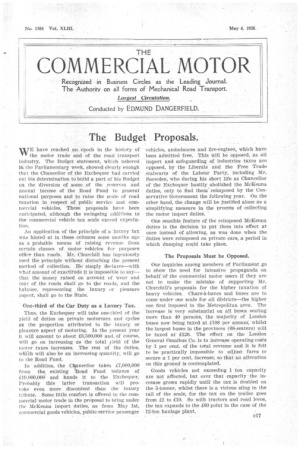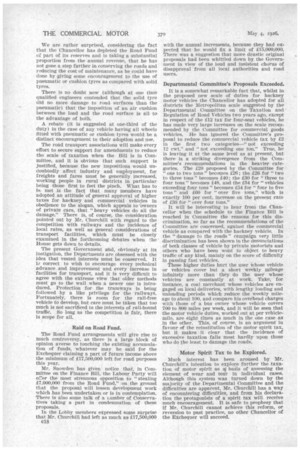The Budget Proposals.
Page 1

Page 2

If you've noticed an error in this article please click here to report it so we can fix it.
WE have reached an epoch in the history of the motor trade and of the road transport industry. The Budget statement, which ushered in. the Parliamentary week, showed clearly enough that the Chancellor of the Exchequer had carried out his determination to build a part of his Budget on the diversion of some of the reserves and annual income of the Road Fund to general 'national purposes and to raise the scale of road :taxation in respect of public Service and cellamenial vehicles. These proposals have been anticipated, although the swingeing additions to the commercial vehicle tax scale exceed expectati on.
An application of the principle of a luxury tax was hinted at in these columns some months ago as a probable means Of raising revenue from certain classes of motor vehicles for purposes other than roads. Mr. Churchill has ingeniously used the principle without disturbing the present method of collection. He simply declares—with what amount of exactitude it is impossible to say— that the Money raised on account of wear and tear of the roads shall go to the roads, and the balance, representing the luxury or pleasure aspect, shall go to the State.
One-third of the Car Duty as .a Luxury Tax.
Thus, the Exchequer will take one-third of the yield of duties on private motorcars and cycles as the proportion attributed to the luxury or pleasure aspect of motoring. In the present year it will amount to about £3;500,000 and, of course, will go on increasing as the total yield of the motor taxes increases. The rest of the duties, whi-Ch will also be an increasing quantity, will go to the Road Fund. .
In addition, the C4ancellor takes £7,000,000 from the, existing 'Road Fund balance of £19,000,000 and hands it to the Exchequer. Probably this latter transaction will provoke even more discontent than the luxury tribute. :. Some little comfort is offered to the commercial motor trade in the proposal to bring under the McKenna import duties, as from May 1st, commercial goods vehicles, public-service passenger vehicles, ambulances and fire-engines, which have been admitted free. This will be opposed, as all import and safeguarding of Industries taxes are opposed, by the Liberals and the Free Trade stalwarts of the Labour Party, including Mr. Snowden, who during his short life as Chancellor of the Exchequer hastily abolished the McKenna duties, only to find them' reimposed by the Conservative Government the following year. On the other band, the change will be justified alone as a simplifying measure in the process of collecting the motor import duties.
One sensible feature of the reimposed McKenna duties is the decision to put them into effect at once instead of allowing, as was done when the duties were reimposed on private cars, a period in which dumping could take place.
The Proposals Must be Opposed.
Our Inquiries among members of Parliament go to show the need for intensive propaganda on behalf of the commercial motor users if they are not to make the mistake of supporting Mr. Churchill's proposals for the higher taxation of heavy vehicles. Chars-à-bancs and buses are to come under one scale for all districts—the higher one first imposed in the Metropolitan area. The increase is' very substantial on all buses seating more than 40 persons, the majority, of London buses now being taxed at £108 per annum', whilst the largest buses in the provinces (68-seaters) will be taxed at £126. The effect on the London General Omnibus Co. Is to inerea,se operating costs by 1 per cent. of the total revenue and it is felt to be practically impossible to adjust fares to secure a 1 per cent. increase, so that no alteration • on this ground is contemplated.
Goods vehicles not exceeding 1 ton capacity are not affected, but over that capacity the increase grows rapidly until the tax is doubled on • the 5-tonner, whilst there is a vicious sting in the tail of the scale, for the tax on the trailer goes from £2 to £10. So with tractors and road locos, the tax expands to the £60 point in the case of the 12-ton haulage plant. We are rather surprised, considering the fact . that the Chancellor has depleted the Road Fund of part of its reserves and is taking a substantial Proportion from the annual revenue, that he has not gone a step farther in conserving the roads and reducing the cost of maintenance, as he .could have done by giving some encouragement to the use of pneumatic or cushion tyres as compared with solid tyres.
There is no doubt now (although at one time qualified engineers contended that the solid tyre did no more damage to road surfaces than the pneumatic) that the imposition of an air cushion between the load and the road surface is all to the advantage of bath.
A rebate (it is suggested at one-third of the duty) in the case of any vehicle having all wheels fitted with pneumatic or cushion tyres would be a distinct encouragement to their adoption and use.
The road transport associations will make every effort to secure support for amendments to reduce the scale of taxation when the Bill is in Committee, and it is obvious that such support is justified, because the new impositions would undoubtedly affect industry and employment„ for freights and fares must be generally increased, working people in rural districts in particular being thase first to feel the pinch. What has to be met is the fact that many members have adopted an attitude of general approval of higher taxes for hackney and commercial vehicles in obedience to the slogan, which appeals to-awners of private cars, that " heavy vehicles do all the damage." • There is, of course, the consideration pointed out by Mr. Churchill with regard to the competition with railways and the incidence of local rates, as well as general considerations of transport facilities, which must be closely examined in the forthcoming debates when the House gets down to details.
The present Government and, obviously at its instigation, the Departments are obsessed with the idea that vested interests must be conserved. It correct to wish to encourage every technical .advance _ and improvement and every increase in facilities for transport, and it is very difficult to agree with the extreme view that older methods must go to the wall when a newer one is introduced. Protection for the tramways -is being followed by a like privilege for the railways. Fortunately, there is room for the rail-free vehicle to develop, but care must be taken that too much is not sacrificed to the interests of rail-bound traffic. So long as the competition is fair, there is scope for all.
Raid on Road Fund.
• The Road Fund arrangements will give rise to much controversy, as there is a large block of opinion averse to touching the existing accumulation of funds, whatever may be said for the Exchequer claiming a part of future income above the minimum of £17,500,000 left for road purposes this year.
Mr. Snowden has given notice that, in Committee on the Finance Bill, the Labour Party will refer the most strenuous opposition to "stealing £T,000,000 from the Road Fund," on the ground that the proposal will lessen development work whieh has been undertaken or is in contemplation. There is also some talk of a number of Conservatives taking a part in condemnation of these proposals.
In the Lobby members expressed some surprise that Mr. Churchill had left as much as £17,500,000 c18 with the annual increments, because they had expected that he would fix a limit of £15,000,000. There was a suggestion that more drastic original proposals had been whittled down by the Government in view of the loud and insistent chorus of disapproval from all local authorities and road users.
Departmental Committee's Proposals Exceeded.
It is a somewhat remarkable fact that, whilst in the proposed new scale of duties for hackney motor vehicles the Chancellor has adopted for all districts the Irletropolitan scale suggested by the Departineutal Committee on the Taxation and Regulation of Road Vehicles two years ago, except in respect of the £12 tax for four-seat vehicles, he has made very large increases on the scale recommended by the Committee for commercial goads vehicles. He has ignored the Committee's proposal to reduce the commercial vehicle tax by £2 in the first two categories—" not exceeding 12 cwt.".and "not exceeding one ton." True, he is leaving it at the same level as at present, but there is a striking divergence from the Committee's recommendations in the heavier categories. The £20 proposed by the Committee for "one to two tons" becomes £26; the £26 for "two to three tons" becomes £40; the £30 for "three to four tons " becomes £48, and the £34 for " vehicles exceeding four tons" becomes £54 for "four to five tons" and £60 for "over five tons," which is exactly 100 per cent. increase on the present rate of £30 for "over four tons." -• It will be interesting to bear from the Chancellor when the schedule to the Finance Bill is reached in Committee the reasons for -this discriminatlian, so far as the recommendations of the Committee are concerned, against the commercial vehicle as compared with the hackney vehicle. In the "damage to the roads" campaign very little discrimination has been shown in the denunciations, of bath classes of vehicle by private motorists and others who have been wont to object to heavy traffic of any kind, mainly on the score of difficulty in passing fast vehicles.
These higher duties hurt the user Whose vehicle or vehicles cover but a short weekly mileage infinitely more than they do the user whose vehicles are constantly at work. Take, for instance, a coal merchant whose Vehicles are• engaged on local deliveries, with lengthy loading and unloading periods which reduce the weekly mileage to about 100, and compare his overhead charges with those of a bus owner whose vehicle covers 700 to 800 miles per week, and it will be seen that the motor vehicle duties, worked out at per vehiclemile, are eight times as much: in the one case as .in the other. This, of course, is an argument in favour of the reinstitution of the motor spirit tax, but it makes it clear that the incidence of excessive taxation falls most hardly upon those who do the least to damage the roads.
Motor Spirit Tax to be Explored.
Much interest has been aroused by Mr. Churchill's intention to explore further the taxation of . motor spirit as a basis of assessing the element of wear and tear in individual cases. Although this system was turned down by the majority of the Departmental Committee arid the difficulties are apparent, Mr. Churchill has a way of encountering difficulties, and from his declaration the protagonists of a spirit tax will receive much encouragement. It is safe to prophesy that If Mr. Churchill cannot achieve this reform, or reversion to past practice, no other Chancellor of the Exchequer will succeed.
































